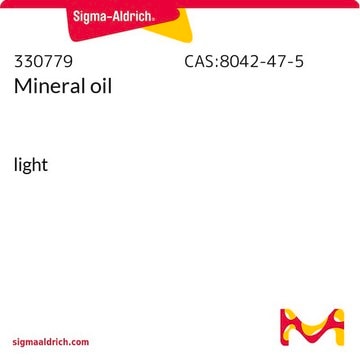132047
1,2,4-Trichlorobenzene
ReagentPlus®, ≥99%
About This Item
Produits recommandés
Densité de vapeur
>6 (vs air)
Niveau de qualité
Pression de vapeur
1 mmHg ( 40 °C)
Gamme de produits
ReagentPlus®
Pureté
≥99%
Forme
solid or liquid
Température d'inflammation spontanée
1060 °F
Limite d'explosivité
6.6 %, 150 °F
Indice de réfraction
n20/D 1.571 (lit.)
Point d'ébullition
214 °C (lit.)
Pf
16 °C (lit.)
Solubilité
water: insoluble
Densité
1.454 g/mL at 25 °C (lit.)
Chaîne SMILES
Clc1ccc(Cl)c(Cl)c1
InChI
1S/C6H3Cl3/c7-4-1-2-5(8)6(9)3-4/h1-3H
Clé InChI
PBKONEOXTCPAFI-UHFFFAOYSA-N
Vous recherchez des produits similaires ? Visite Guide de comparaison des produits
Catégories apparentées
Description générale
Application
1,2,4-Trichlorobenzene may be used as a solvent in the synthesis of indene-C60 bis adduct, which can find applications in high performance solar cells. It can also be used as a carrier gas in the textile industry.
Informations légales
Mention d'avertissement
Warning
Mentions de danger
Conseils de prudence
Classification des risques
Acute Tox. 4 Oral - Aquatic Acute 1 - Aquatic Chronic 1 - Skin Irrit. 2
Code de la classe de stockage
6.1C - Combustible acute toxic Cat.3 / toxic compounds or compounds which causing chronic effects
Classe de danger pour l'eau (WGK)
WGK 3
Point d'éclair (°F)
235.4 °F - closed cup
Point d'éclair (°C)
113.0 °C - closed cup
Certificats d'analyse (COA)
Recherchez un Certificats d'analyse (COA) en saisissant le numéro de lot du produit. Les numéros de lot figurent sur l'étiquette du produit après les mots "Lot" ou "Batch".
Déjà en possession de ce produit ?
Retrouvez la documentation relative aux produits que vous avez récemment achetés dans la Bibliothèque de documents.
Les clients ont également consulté
Notre équipe de scientifiques dispose d'une expérience dans tous les secteurs de la recherche, notamment en sciences de la vie, science des matériaux, synthèse chimique, chromatographie, analyse et dans de nombreux autres domaines..
Contacter notre Service technique










